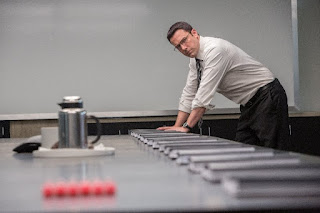Neuro Note 4: The Accountant

I recently watch the movie The Accountant because it had been suggested to me by a friend that knows I have an interest in working with individuals with autism. I decided to write a neuro note on the movie because I think it provides a unique representation of a neurological disorder, as an action movie. The movie starts out in Christian’s childhood, as his parents take him to a specialist seeking help with this autism (ASD). Then flash forward to adulthood, Christian, is a savant with numbers and has used that to become a successful accountant, along with working as an ‘accountant’ for criminal organizations. The movie depicts how Christian goes through his life and his work with ASD. At one point in the movie Christian talks about how he doesn’t have relationships because he does not do well talking to others. He has a very specific schedule and will panic if he cannot finish a task, shown to impact his life significantly. At the end of the day he applies sensory input (ove...
